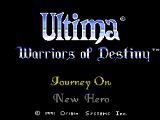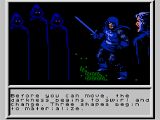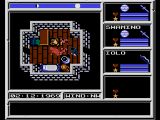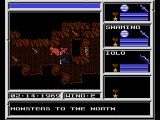NES-port of Ultima V
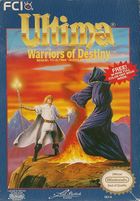
Like Ultima III and Ultima IV before, Ultima V was ported to the NES as well. However, unlike the two previous games, Origin Systems decided to go a different direction with this port.
Description[edit]
Work on the NES conversion began in 1991, after the release of Ultima VI. Rather than release an antiquated-looking conversion of Ultima V, which would have been well within the abilities of the NES, Origin changed key elements of the port to resemble the more-recent Ultima VI: a single-scale map, isometric perspective, and character portraits (something the original game did not have). The NES-port is also a break with its predecessors in that it was not developed in Japan, but in the USA. As such, it does not use Japanese-like graphics; instead, the graphics are made to look more Western. For the first time on the NES, it is even possible to hold conversations with NPCs, using a selectable-keyword system similar to that introduced in Ultima VII; NPC dialogue in the previous NES-ports had been non-interactive.
Despite these improvements over the original release (or perhaps, because of them), the NES-port of Ultima V was seen as a technical disappointment. Combined with elements that had to be removed from the game because of technical limitations (limitations that would not have applied if the original tile-based system had been used), the changes made reviews generally see this port as totally inferior to the original.
Nintendo Power gave Ultima V a rating of 2.8/5 for graphics and sound, 2.0 for play controls, 3.3 for challenge, and 3.3 for play and fun, highly praising its open world, intricate conversations, and numerous gameplay options while criticizing its poor control scheme.[1]
Included with the Game[edit]
The Shortcomings of the Port[edit]
The shortcomings include:
- The game is very slow compared to the original, making it difficult to progress at a reasonable rate.
- There is no way to name the Avatar, and no option for a female Avatar.
- Particularly when viewed on a TV, it is difficult to discern what the various on-screen objects are.
- After the title screen and the character creation, there is only one song throughout the entire game (the same error as in the Amiga-port), and there are no sound effects.
- Because of the single-scale map, Britannia had to be shrunken and deformed to fit everything in. It just is not that obvious during gameplay because of the limited viewing window and the game’s slow pace.
- This in turn means that the number of NPCs was drastically reduced, and they also now have much less to say. Additionally, the content that was left was altered significantly, mixed with story changes (instead of being in the Yew prison, Greymarch is now running around in Trinsic).
- The controls are surprisingly complicated for a two-button controller, and each command has a slight delay before execution.
- The maximum size of the party was reduced from six to four (since the game starts with three members, this means only one can be recruited).
- Technical limitation example: all swamps are instead represented by poison energy fields.
- Horseriding was eliminated by claiming that hungry people have eaten nearly all the horses, similar to the C64-port of Ultima VI, where the Gargoyles are blamed with this.
- The introduction is vastly reduced, with much plot and background information missing.
- The ending sequence is altered much as the introduction, and much content was altered; the Avatar is present with Lord British at Blackthorn’s exile (thus the part on Earth is missing) and drama is lost by the last sentence being Lord British inviting the Avatar to a feast.
- The conversation system presents a menu of available keywords characters may know about, which may not normally always be known in the original game (learning about them was part of the unfolding quest, via previous conversations and readings, and keywords were entered with a keyboard, not selected from a menu).
Trivia[edit]
- Unlike the other games, this console port was not released in Japan. It is unknown why that decision was made.
Gallery[edit]
See Also[edit]
External Links[edit]
- Ultima V NES Playthrough: Warriors of Destiny (YouTube)
- Ultima V NES Gameplay (YouTube)
References[edit]
- ↑ "Now Playing". Nintendo Power (Ultima V). Feb. 1993. Pages 105,106.
| Console Ports | |
|---|---|
| Games | Ultima III ☥ Ultima IV ☥ Ultima V ☥ Ultima VI ☥ Savage Empire ☥ Ultima Underworld ☥ Ultima VII |
